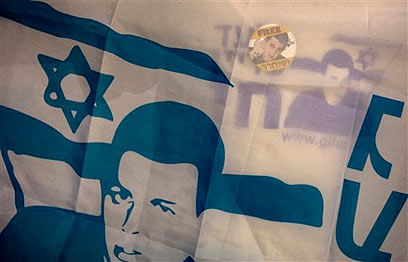
Gilad Shalit
None
Gilad Shalit is the son of Noam and Aviva Shalit. The family resides in Mitzpe Hila in northern Israel, and are both Israeli and French nationals.
Shalit was captured when a terrorist cell infiltrated the border and attacked an IDF force patrolling near the the Kerem Shalom border crossing, which is a cargo crossing on the Gaza Strip-Israel-Egypt borders.

Shalit in the Hamas-made video (Photo: Reuters)
The raid and subsequent abduction were claimed as a joint operation by three Gaza-based terror groups: Hamas' Izz al-Din al-Qassam Brigades, the Popular Resistance Committees, and a previously unknown militant group called "The Army of Islam."
Shalit's location is essentially unknown. Hamas has denied the International Red Cross any access to him, in direct contravention of the Geneva Convention; and has ignored all such requests from Israel, France and multiple human rights organizations.
To date, Hamas has provided Israel with only meager proof of life from Shalit, in the form of three letters, an audio tape and a DVD that Israel received in exchange for releasing several female Palestinian prisoners.
Negotiations for release
Hamas demands the release of about 1,000 prisoners held in Israel in exchange for Shalit's return, including some who Israel considers "heavyweight terrorists," who were directly – and sometimes personally –involved in the planning and execution of dozens of deadly terror attacks against Israelis.
The lengthy and so far unsuccessful negotiations meant to secure Shalit's release were originally brokered by Germany, with Egypt eventually taking the lead. Since Shalit is a French national, Paris and the EU are also pushing for his release and have some involvement in the negotiations.
Israel agreed in principle to go through with a prisoner exchange deal, but has adamantly maintained that top Hamas leaders would not be among those released.
It is widely believed that Gilad Shalit is no longer being held in Gaza Strip. Foreign intelligence sources allege that he is in all likelihood being held in Egypt, ahead of a prisoner exchange deal.

(Photo: AP)
Public campaign
Alongside the diplomatic efforts to secure Shalit's release, the Shalit family has launched a wide scale public and diplomatic campaign meant to see to their son's safe return.
The Shalit family regularly arranges mass marches and rallies; Noam and Aviva Shalit, Gilad's parents, meet with Israeli and foreign statesmen on the matter; and the family is pushing to see Gilad's release included in any peace deal struck with the Palestinian Authority – should such a deal be achieved prior to his release.
In March 2009, the family erected a protest tent outside the prime minister's official residence in Jerusalem. The tent is frequented by thousands of Israelis every month, including the president, foreign dignitaries and diplomats and Knesset members.
In July 2009, the Shalit Campaign – a volunteer group dedicated to ensuring the captive soldier's release – launched a multimedia "blitz" of emails, letters and text messages on Gilad's behalf, all reading just one word – "HELP." The image was crafted in Shalit's own handwriting, taken from one of the letters received as proof of life.
Prisoner exchange
The Shalits' demand to see their son released even at the price of releasing hundreds of terrorists has sparked a public debate on the issue of a future prisoner exchange deal's "price." Those opposing such a swamp include mostly members of bereaved families and security officials.
The public debate over how many prisoners should be released in exchange for Gilad Shalit, what would be the conditions of their release, and whether such a deal should include terrorists convicted of direct involvement in attacks which claimed Israeli lives, is ongoing.
In early October 2011, Prime Minister Benjamin Netanyahu announced that Hamas had finally agreed to a prisoner exchange deal that would secure Shalit's safe return.
As part of the deal, Israel agreed to release 1,027 Palestinian security prisoners, in two stages.
The deal was welcomed by the majority of the Israeli public, but several High Court petitions were filed by families of terror victims in an attempt to suspend it. The court rejected the petitions, stating that since the prisoner exchange deal was a matter of State in which the government had full authority, the court had no room to intervene in its execution.
On October 18, 2011, after nearly five and a half years in Hamas captivity, Gilad Shalit was finally reunited with his family.










